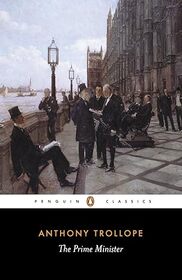
Henry James wrote that Trollope’s “political novels are distinctly dull,” and confessed that he had been unable to read them. Although the Palliser novels, of which The Prime Minister (1876) is the penultimate, do contain a running political theme, I can happily report that these elements can be skimmed with no ill effects. Having said that, the collapse of a precarious Coalition government and talk of Tories in Liberal clothing have a certain resonance for current British readers.
The plot of The Prime Minister is completely dominated by the larger than life Ferdinand Lopez, a handsome adventurer of Portuguese-Jewish descent. In addition to infinite riches, Lopez is determined to secure the hand of Emily Wharton, daughter of a wealthy and conservative-minded barrister. Mr Wharton wrestles with his own prejudices and what he perceives as the inveterate anti-Semitism of Victorian society, but grudgingly relents after Lopez apparently saves the life of Emily’s brother. Wharton hadn’t wanted to give his fortune to “one who is not the son of an English gentleman,” instead favouring the safe and solid Arthur Fletcher.
Having got his feet under the table, Lopez rapidly transforms from scoundrel to fully-fledged Vaudeville villain, and the plot descends into melodrama. He extracts significant sums of money from his father-in-law in order to trade in guano, also relentlessly exploiting his business partner along the way. Lopez’s initial specious successes turn to disaster, and he becomes increasingly aggressive to his young wife, bullying her into obtaining more funds from her father. His attempt to enter the House of Commons, which in his mind would have established him as an English gentleman, is thwarted by Arthur Fletcher, thereby compounding his misery.
When both his business and his marriage collapse around him, Lopez has nothing to live for. In one of Trollope’s most dramatic and compelling scenes, Lopez throws himself in front of an express train at Tenway (Clapham) Junction, and is blown to “bloody atoms”. It is a moment worthy of Zola. The widowed Emily is placed in the difficult position of having to appear distraught, when his death is actually a lucky release for her. There is no time for her to reflect, however; her father and brother quickly manoeuvre her into a second marriage with Arthur Fletcher, keen that the purity of their line should be re-established.
Although in He Knew He Was Right Trollope tentatively suggested that women ought to have some control over their marital destiny, he reverts to his usual conservative line in this novel. Emily is repeatedly punished for having chosen a husband of whom her father doesn’t approve. Lopez treats her badly, making her life a misery and severely testing her sense of wifely duty. She must also suffer the trauma of her newborn baby’s death, and descends into what appears to be clinical depression. Even after such trials, she must do further penance by submitting to a hasty second marriage to restore the family honour. The authorial voice continually reminds the reader that all this unpleasantness could have been avoided if only Emily had listened to her father: misery will ensue if young women are allowed to make important decisions.
Initially, The Prime Minister seemed set to challenge prejudices concerning race, gender and class, but ultimately confirms them all. The more progressively-minded characters who support Lopez are shown the error of their ways. The Duchess of Omnium (formerly Lady Glencora Palliser) suffers humiliation after supporting his bid to enter Parliament, and is essentially told to confine herself to domestic affairs. Lopez’s business partner, Sexty Parker, a self-made man from a lower-class background, is eventually forced to live on the charity of Mr Wharton, by means of a weekly pension doled out to him like outdoor relief. Everyone is ultimately restored to their rightful place.
Notwithstanding its frustratingly conservative resolution, The Prime Minister is one of the most engaging novels in the Palliser series. It falls down on structure, but mainly because Lopez entirely subsumes the narrative. This fault can be forgiven, however, as he is one of Trollope’s best creations.
The Prime Minister by Anthony Trollope